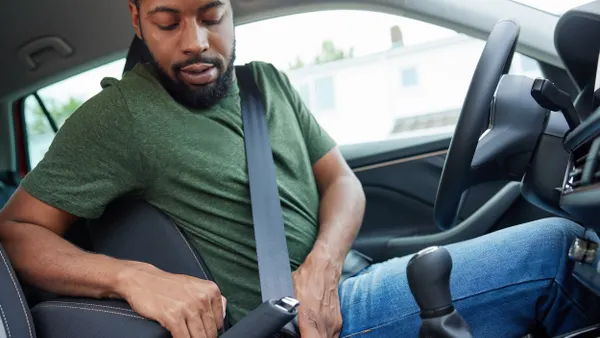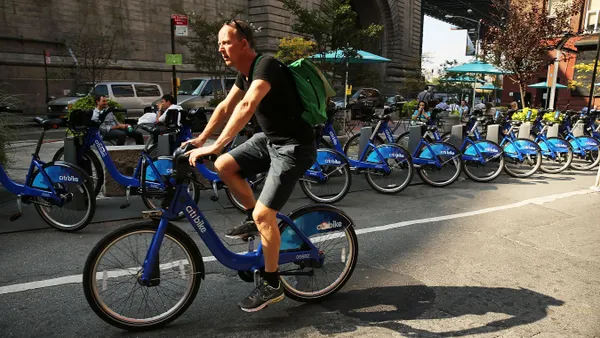UPDATE: May 5, 2020: The Mobility Data Consortium (MDC) on Tuesday unveiled two best practice guides to help cities with micromobility data management: one with guidelines for data-sharing governance and contracting; and the other providing a glossary of terms and data metrics.
The data-sharing document recommends a series of guidelines that consider the differing goals of the public sector and mobility companies, while also keeping in mind customers' right to privacy.
The guidelines call on all parties involved in mobility data-sharing to address the benefits and challenges associated with it; evaluate risks through impact assessments; consider anonymization and de-identification techniques for the data; engage consumer groups for their input; and identify the role third parties can play, among other recommendations.
The glossary and guide on data metrics is a bid to create consistency across the micromobility industry. That consistency is designed to help cities as they craft dockless regulations, and to help companies that look to conform with those regulations.
Dive Brief:
- A consortium convened by SAE International around micromobility data management has officially launched and will focus initially on performance metrics and data privacy. The Mobility Data Collaborative (MDC) features partners from the industry, public sector, academia and advocacy groups.
- The partners include operators Bird, Lyft, Spin and Uber; the cities of Bellevue, WA and Tallahassee, FL; Miami-Dade County, FL; the Denver Regional Council of Governments; the North American Bike Share Association (NABSA); Populus; StreetLight Data; the Innovations in Mobility and Transportation Safety Lab at McGill University; and the Transportation Sustainability Research Center at the University of California at Berkeley. Annie Chang, head of new mobility at SAE and director of MDC, told Smart Cities Dive the group is open to adding more members as its work evolves.
- Officials said in an announcement that MDC will "build from the knowledge of its current and future members to establish frameworks and tools to facilitate data sharing between cities and growing fleets of private mobility companies." Chang said that currently, there are numerous tools for data-sharing and governance right now, so there are plenty of issues to resolve.
Dive Insight:
With the explosion of micromobility options on city streets, local leaders have sometimes been caught flat-footed by the need to manage them and set standards for their deployment and use, sometimes butting heads with operators.
A key part of cities' rules on allowing dockless bikes and scooters has been the need to measure their performance: not only their day-to-day usage citywide but also ensuring they are placed in underserved communities to provide residents another mobility option.
Such data tracking has been piloted in similar partnerships between Detroit, Lime and the National Association of City Transportation Officials (NACTO). Cities should require trip data that will allow them to evaluate system performance, determine permit compliance and answer planning questions, according to NACTO, while also requiring companies to comply with strict privacy standards.
MDC's work could touch on this in its measurement of performance metrics, but Chang said that has been difficult due to the lack of a standardized reporting process, something the group might work on in some form.
"The way that each operator is reporting is different, the way that the cities are requiring this to be reported are different, so we're unable to compare apples to apples at this time," Chang said.
But some collaborations around micromobility data have come under fire. In Los Angeles, its Mobility Data Specification (MDS) has been the subject of challenges from Uber, which has seen its Jump bikes and scooters suspended from operating on city streets and could lead to legal action.
Some private sector participants have raised concerns over privacy of data-sharing initiatives like MDS, and Chang said one way to ease those concerns could be a consortium that works together to find a common solution.
"Right now, every time a city opens the doors to a new operator or an operator enters a new city, there are these custom-built one-off data sharing and licensing agreements," she said. "In order to streamline that process and also ensure that the personally identifiable information is protected for the users or consumers of these services, we're working on standardizing the data governance models."
The MDC's work in micromobility could be a forerunner to similar efforts around data-sharing in other mobility modes, Chang said. She also said she hoped to "change the narrative" around data-sharing and move it from being focused on compliance with rules to something that has clear public benefits.
"Micromobility, I see as almost like a guinea pig to data-sharing," Chang said. "I anticipate that data-sharing will go into other shared travel modes."










